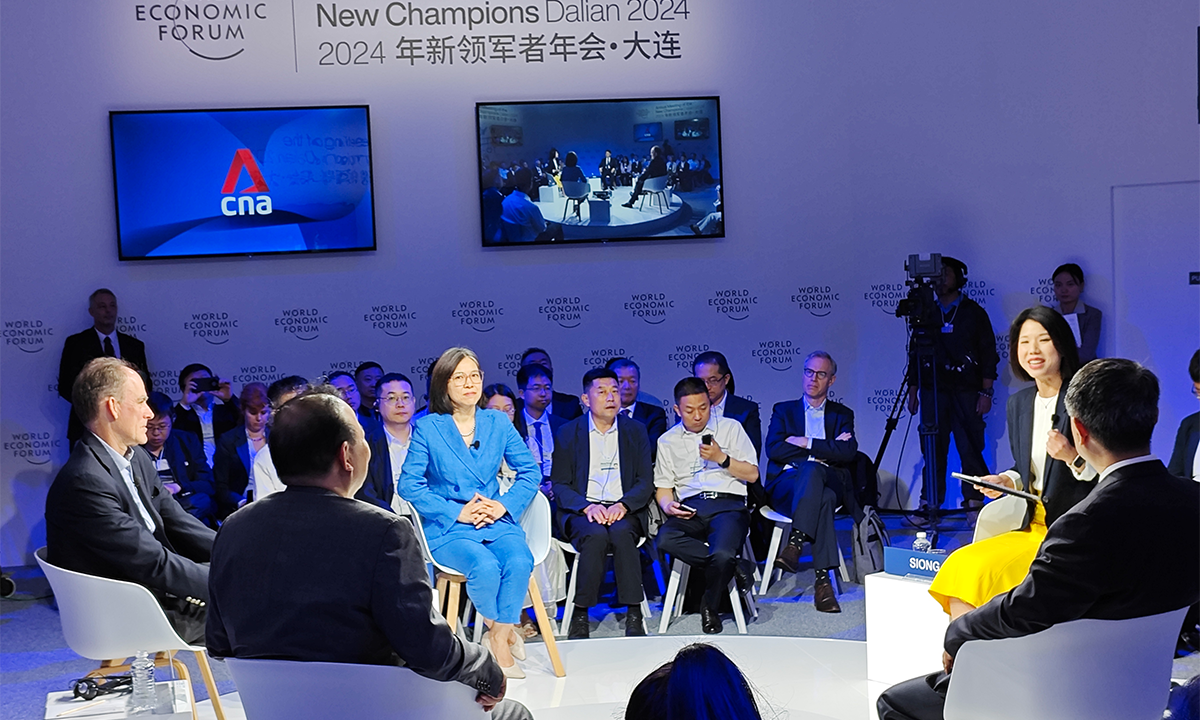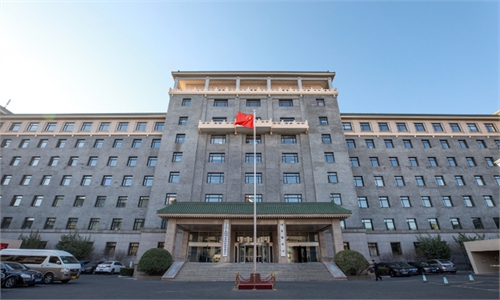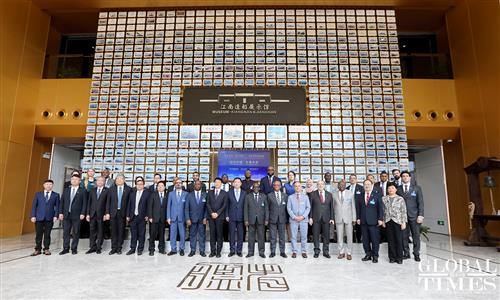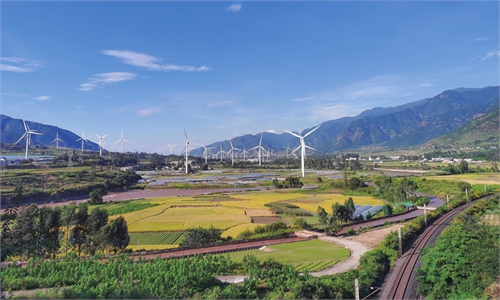Representatives from international community praise China’s open and cooperative stance on EV development, defying Western protectionism
Representatives praise China’s cooperative stance in EV sector, defying West protectionism

A penal discussion held during the Summer Davos in Dalian, Northeast China's Liaoning Province on June 25, 2024. Photo: Yin Yeping/GT
Government officials, business representatives, and experts from various countries and regions convened at the three-day 15th Annual Meeting of the New Champions, also known as the Summer Davos, in Dalian, Northeast China's Liaoning Province starting on Tuesday to discuss pressing global issues, emphasizing the need for increased global cooperation, particularly within the new-energy sector.
Participants of the world meeting said that China's competitive edge in electric vehicles (EVs) has significantly contributed to advancing green transformation through cost-effective production. They advocated collaboration rather than confrontation in addressing climate change, responding to the intensified protectionist moves by the US-led West targeting Chinese EVs over the so-called overcapacity rhetoric.
The event, themed "Next Frontiers for Growth," is taking place from Tuesday to Thursday, bringing together around 1,600 leading figures from the public and private sectors across nearly 80 countries and regions to collectively explore innovative drivers and pathways for advancing global economic growth, according to the World Economic Forum.
China is committed to addressing climate change and has been proactively developing green industries such as new energy, Chinese Premier Li Qiang said on Tuesday. Li made the remarks when addressing the opening plenary of the Summer Davos in Dalian, Xinhua News Agency reported.
The rapid rise of China's new industries has been in line with the global trend of technological revolution and green development, Li said. EVs, lithium batteries, and photovoltaic products produced by Chinese companies have not only met domestic demand but also enriched the global market supply, the Chinese premier said.
"Countries and regions should avoid engaging in trade protectionism under the guise of "promoting green and environmentally-friendly development," Li further noted.
Li's remarks immediately gained applause from the Summer Davos' participants from around the world. They praising China's openness to the world for cooperation and competition, despite the West's growing protectionism.
It's reassuring that China is staying open to the world, and that it is trying to have a level playing field for all the participants in the second largest economy, including in new-energy sector, Benoit Boulet, associate vice-president of Research and Innovation at McGill University in Canada, told the Global Times on Tuesday, after attending the meeting on Tuesday.
Boulet has recognition to the fact that Chinese companies are helping reduce the world price of EVs, giving example of how Tesla has been able to reducing its prices through its gigafactory in Shanghai.
Speaking at Tuesday's forum, Mirek Dusek, managing director of the World Economic Forum, also said that China has become a leader in some aspects of the green economy, giving example of specific sectors such as (EV) battery and corresponding technology in the field.
Dusek said that it is important that this meeting in Dalian serves a bigger purpose of providing a platform for dialogue and for leaders from around the world trying to better understand where China is economically and where it's headed in terms of really trying to unlock new sources of growth.
Fair competition should be allowed if the world is going to advance climate change, Hani Abdulhadi, managing director of Lamar Holding, a company specializes in developing and operating projects across the Saudi energy market, told the Global Times on Tuesday. The Saudi company has been in close cooperation with Chinese companies in green-energy sector for many years.
As a strong advocate for international cooperation, Abdulhadi said that excessive protection for businesses can stifle innovation. Instead of erecting barriers, the US and the EU should focus more on their own innovation and invest more in the EV sector to enhance their competitiveness, he said.
Responding to the so-called overcapacity rhetoric, Abdulhadi said that currently, the whole EV market is still new while the claims of extra capacity is both "a weak claim and one made too early."
According to data by the China Passenger Car Association, China exported 870,000 new EVs from January to May 2024, marking a 29 percent year-on-year increase, reflecting thriving global demand for green transformation in which China's EVs have played an increasingly important role.
Global cooperation is crucial for green transformation, Wen Shugang, chairman of China Huaneng Group, said at the sub-forum themed "Not Losing Momentum on the Energy Transition" on Tuesday.
Wen said that the world should work together to eliminate non-technical barriers, including trends toward de-globalization or trade protectionism, as well as geopolitical influences. "This will allow our shared technological advancements to benefit humanity as a whole," he said.
In a group media session at Tuesday's forum, China's special envoy for climate change Liu Zhenmin said, in response to the issue of the US and EU imposing additional tariffs on Chinese EVs, that this bilateral trade matter should not be made part of multilateral climate negotiations.
Liu stated that China views this as a bilateral trade issue while introducing it into multilateral climate negotiations could cause the entire multilateral climate cooperation to "completely collapse." Such issues can only be resolved through bilateral negotiations, Liu noted.
Liu also emphasized that the notion of "China's overcapacity in new-energy production" is misleading.
"From the perspectives of societal and market demand, both domestically and internationally, the production capacity of new energy is far from sufficient. There remains a need to continue increasing production capacity to meet the energy transition demands of China and the world," Liu said.



